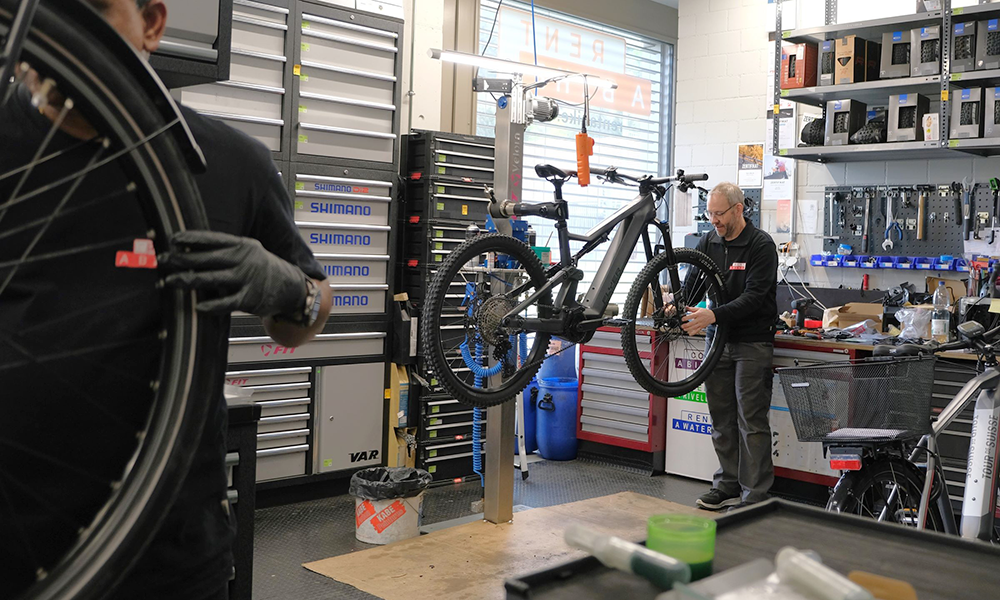Interview: Was kostet ein E-Bike über seine Lebensdauer hinweg?
Versicherung, Wartung und Co. – auch nach dem Kauf verursacht ein E-Bike Kosten. Doch wie hoch ist die Belastung wirklich? Wie hoch sind die E-Bike Kosten pro Kilometer? Und wie hoch sind die E-Bike Kosten pro Jahr? Martin Gerber, Werkstattleiter bei der Rent a Bike AG in Willisau liefert uns im Interview die Antworten auf diese und weitere Fragen.
Martin, bevor wir über die laufenden Kosten eines E-Bikes sprechen: Stell dich unseren Leserinnen und Lesern gern vor.
Martin Gerber: Ich arbeite als Werkstattleiter bei der Rent a Bike AG in Willisau. Wir sind ein Spezialist im Bereich E-Bike Verleih, sind aber auch im Verkauf und im Bereich Werkstatt tätig. Ich selbst bin Quereinsteiger in der Fahrradbranche:
Ursprünglich bin ich gelernter Kraftfahrzeugmechatroniker, habe mich aber nach über 20 Jahren Selbstständigkeit im Automobil-Bereich während der Coronavirus-Pandemie beruflich neu orientiert. Da ich selbst leidenschaftlicher Mountainbiker bin, lag der Schritt in die Velowelt nahe.
Laufende Kosten sind im Automobil-Bereich schon immer ein grosses Thema. Mit dem E-Bike wird aber auch in der Fahrradwelt immer mehr darüber gesprochen. Welche Kosten-Faktoren gibt es nach dem E-Bike Kauf?
Martin Gerber: Wenn wir mit der Werkstatt beginnen, dann sind regelmässige Inspektionen, Reparaturen und Ersatzteile ein Kostenfaktor. Auch mit dem E-Bike verbundene Dienstleistungen wie eine E-Bike Versicherung kosten Geld. Und dann ist da auch noch der Wertverlust, den man ja auch vom Auto kennt.

Fangen wir direkt mit der Werkstatt an: Wie oft sollte ein E-Bike gewartet werden und welche Kosten hat man damit pro Jahr?
Martin Gerber: Grundsätzlich empfehlen wir einen kompletten Service pro Jahr. Dieser liegt bei uns bei 190 CHF plus die Kosten für die Ersatzteile. Hier muss ich allerdings betonen, dass die Kosten sehr stark von der Nutzung abhängen. Wir unterscheiden bei der Inspektion vor allem drei Zielgruppen: Berufspendlerinnen und -pendler, die ihr Elektrovelo täglich bei Wind und Wetter fahren. Hobbybikerinnen und -biker, die bei schönem Wetter Touren unternehmen. Und sportliche Radfahrerinnen und Radfahrer, die ihr E-Bike als Trainingsgerät nutzen.
Bei den Pendlerinnen und Pendlern ist der Verschleiss sehr hoch. Hier empfehlen wir zwei Inspektionen pro Jahr: einen Frühlings-Service und einen Winter-Service. Bei den beiden anderen Zielgruppen ist meist der klassische Frühlings-Service ausreichend. Bei starker oder sehr einseitiger Nutzung – etwa, weil nur wenige Gänge sehr stark beansprucht werden – kann der Verschleiss aber auch hier höher sein.
Der zweite Punkt sind Versicherungen und ähnliche Dienste. Was kostet eine E-Bike Versicherung?
Martin Gerber: Das hängt natürlich stark vom jeweiligen Versicherer und dem Versicherungspaket ab. Ich würde hier 150 CHF pro Jahr ansetzen. Wenn man ein besonders hochwertiges E-Bike besitzt, kann es aber auch mehr sein. Dasselbe gilt, wenn man mehrere E-Bikes besitzt. Was man hier auf jeden Fall beachten sollte, ist, inwieweit das E-Bike auch in der Hausratsversicherung eingeschlossen ist.
Eine Frage, die oft gestellt wird, ist die nach den Stromkosten. Was kostet eine E-Bike Ladung?
Martin Gerber: Auch das ist sehr individuell. Ich bin vor kurzem beispielsweise bei der E-Enduro World Series gestartet. Hier habe ich die E-Bikes gratis über die Solaranlage in meinem Bus geladen. Auch viele Tourismus-Regionen bieten Gratis-Ladestationen an. Auch wenn man an der heimischen Steckdose lädt, sprechen wir hier über wenige Rappen pro Ladung. Ich würde diese Kosten daher nicht in die Kalkulation einbeziehen.
Ein grosses Thema bei E-Bike Kosten ist die Lebensdauer. Wie lange hält ein E-Bike im Durchschnitt und welche Faktoren beeinflussen seine Lebensdauer?
Martin Gerber: Hier gibt es zwei Faktoren, die eine Rolle spielen: der Verschleiss und die Aktualität. Bei guter Pflege kann ein E-Bike gut und gerne sieben bis zehn Jahre halten. Neben den Verschleissteilen ist ein Akku-Tausch dabei wahrscheinlich die grösste Investition. Die Frage ist allerdings, ob jemand sein E-Bike so lange behält. Da sich die Technik in rasender Geschwindigkeit weiterentwickelt, sind die Modelle leider schnell veraltet. Wir brauchen nur heutige E-Bikes mit denen von 2014 zu vergleichen: Da liegen Welten dazwischen.
Du sprichst bereits den E-Bike Akku an. Wann muss er getauscht werden und welche Kosten setzt du hierfür an?
Martin Gerber: Je nach Nutzung ist eine klassische Empfehlung der Hersteller, den Akku alle vier bis fünf Jahre zu tauschen. Ein Ersatz-Akku inklusive Tausch kostet – je nach Anbieter – zwischen 600 und 1'200 CHF.
Welche weiteren Ersatzteile müssen am häufigsten ausgetauscht werden und was kostet deren Ersatz?
Martin Gerber: Klassische Verschleissteile sind die Reifen und Schläuche, die Bremsbeläge, die Kassette und die Kette. Wie hoch die Kosten sind, hängt vom jeweiligen Ausstattungslevel und von der Beanspruchung der Komponenten ab, hier würde ich über einen Zeitraum von fünf Jahren einen dreistelligen Betrag ansetzen. Teurer wird es, wenn bestimmte E-Bike Komponenten ausgetauscht werden müssen – etwa das E-Bike Display.
Kannst du eine Schätzung abgeben, wie viel ein E-Bike über einen Zeitraum von beispielsweise 5 Jahren insgesamt kostet? Und wie hoch die E-Bike Kosten pro Jahr und die E-Bike Kosten pro Kilometer liegen?
Martin Gerber: Es gibt ja den Spruch «Kleinvieh macht auch Mist». Wenn wir alles einberechnen, würde ich bei einem E-Bike mit einem Neuwert von 5'000 CHF den halben Anschaffungspreis obendrauf – also insgesamt 7'500 CHF – ansetzen.

Wie steht es um den Wiederverkaufswert von E-Bikes? Verlieren sie schnell an Wert?
Martin Gerber: Dass der Wertverlust aufgrund der technischen Weiterentwicklung vergleichsweise hoch ist, hatte ich ja bereits erwähnt. Wir stellen das bei uns im Geschäft fest: Die Kundschaft will immer das Neueste, Beste haben. Ein ungefährer Richtwert für den zeitlichen Wertverlust sind daher 25 Prozent nach einem Jahr und 50 Prozent nach drei Jahren. Danach wird ein Wiederverkauf deutlich schwieriger, da möglicherweise ein Akkutausch etc. ansteht.
Zum Abschluss die Frage: Wie schneiden E-Bikes im Vergleich zu Motorrollern oder Autos in Bezug auf die Gesamtkosten über mehrere Jahre ab?
Martin Gerber: Auch wenn es beim E-Bike viele laufende Kosten gibt, ist das die gute Nachricht: Im Vergleich mit dem Mofa oder dem Roller als direkte Konkurrenz ist das E-Bike günstiger. Und im Vergleich mit dem Auto sowieso. Unabhängig von allen finanziellen Fragen sollte man aber auch daran denken, was man durch das E-Bike gewinnt: Man vermeidet Staus im Verkehr, man kann sich sportlich aktiv betätigen und der Fun-Faktor ist auch höher. Das ist für mich unbezahlbar.
Martin, vielen Dank für das Gespräch.
30.04.2024



